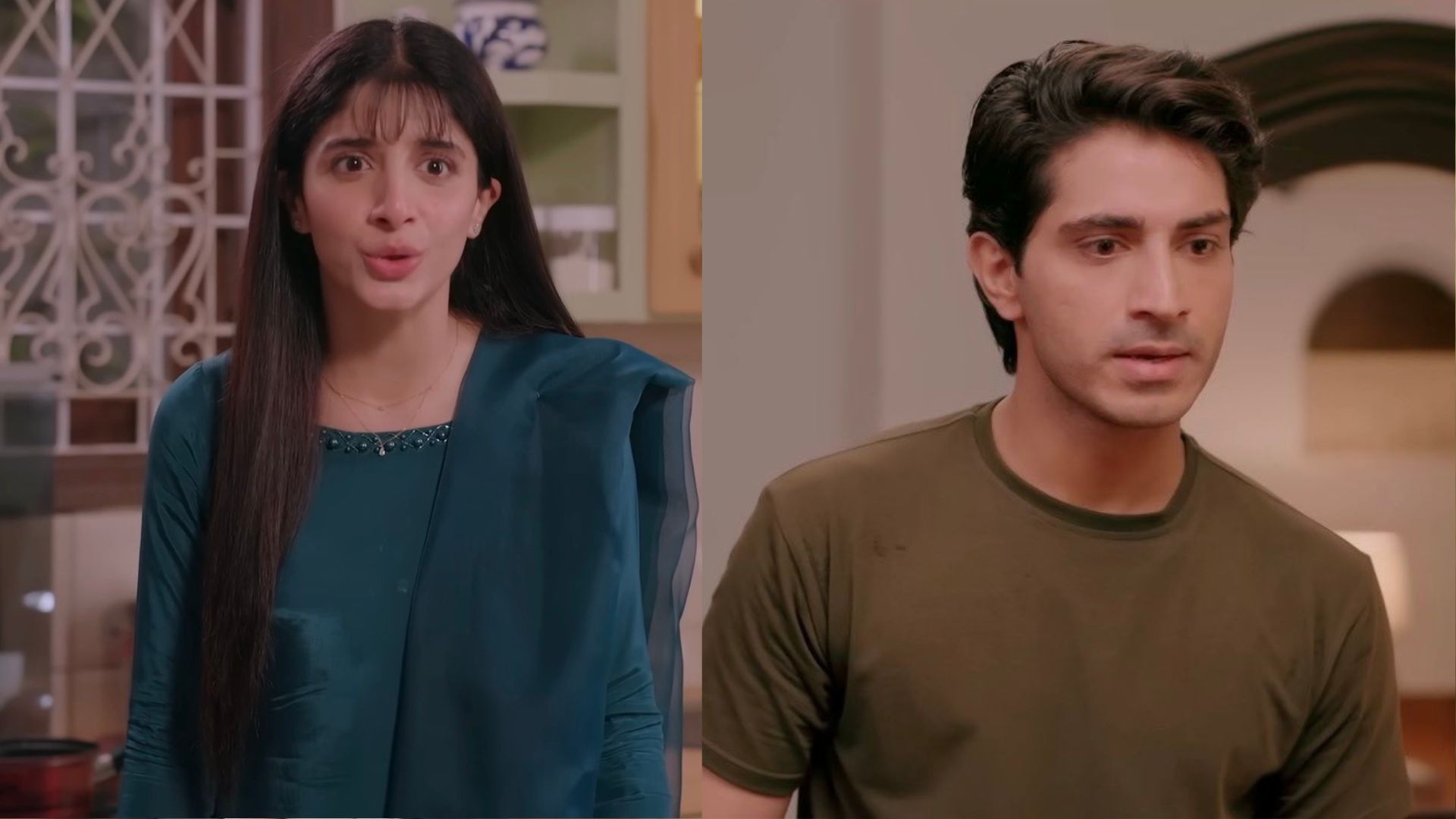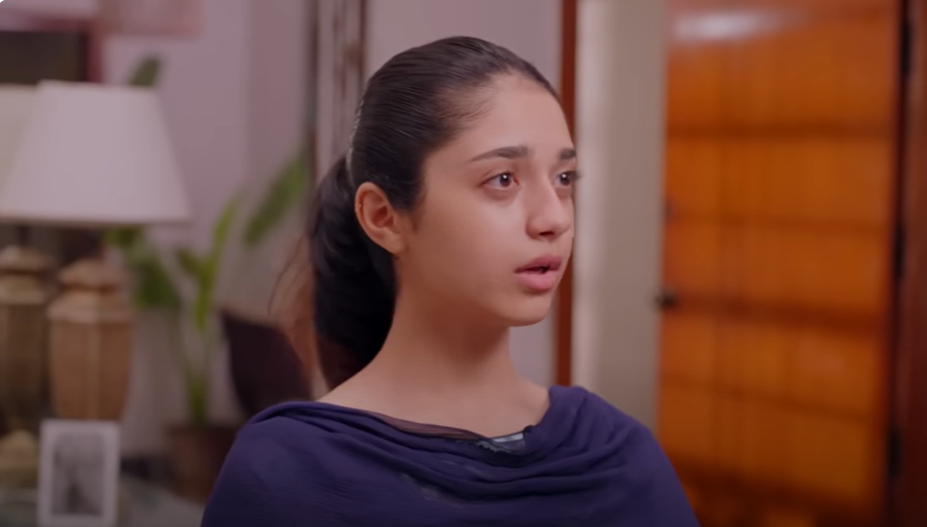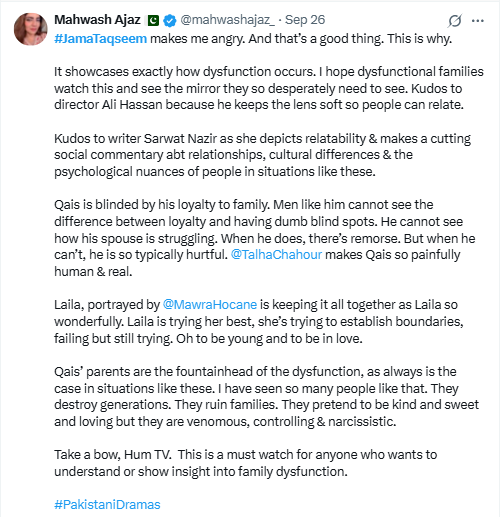Jama Taqseem began airing two weeks ago and it sparked meaningful conversations about dysfunctional families, harassment or how women are stripped of their agency to survive in abusive relationships. The drama centres around Laila and Qais, who fell in love during university and get married, much to the dismay of the later’s family.

From the start of the drama, Qais’s family does not accept Laila into the home because of her desire to work and be financially independent, or her family background. It further accelerates when Laila’s ideals clash with the rest of the family as she isn’t trained in cooking or cleaning like the conservative family expects the women in their family to be, or how she sets boundaries like asking to knock before entering or wanting to work rather than be a stay-at-home wife.
Among the debates on social media revolve around Qais, and whether he fall’s under the term ‘mama’s boy’: someone who is so blindly obsessed with keeping his parents happy that he is willing to disappoint his wife in the process. While others say that the problem isn’t Qais, but how dysfunctional families thrive on rigorous standards that restrict women to their homes and men to the office.

In the recent episodes, Laila suffers immensely as she bears taunts from the family over not knowing household chores, or because she had a love-marriage with Qais. In episode 6, she cries in her room after being scolded by the family for ruining clothes, and claims that she doesn’t know anything at all. Qais consoles her, but in the later scene when he tries to reason with his family members on giving his wife less chores around the house, they complain that she is ‘chalaak’ and purposely mucks up the chores so that she isn’t asked to do them any more.
A user on X sparked a discussion with a post where she called Qais a ‘mummy’s boy’, because knowing that Laila was a headstrong woman who followed her own ideals, he willingly subjected her to his toxic family who had a conservative idea of how women should be.
apni maa se hi shadi karleta mamas boy pic.twitter.com/nZ4RGGmumY
— aswa (@bhensharamkarlo) September 29, 2025
And after watching episode 6 we had to side with this user, because Qais had scolded Laila for taking the dirty laundry to her parents home rather than washing it in her own home, and orders her to apologise to his parents for this simple act.
But as the rest of the users pointed out, Qais is not a mama’s boy but he is also a victim of a toxic family that doesn’t accept men who respect and care about their wives to the point that they stand up for them. As the recent episodes have shown, Qais’s character progression prove that the real villain of his show is dysfunctional parents.
Qais isn’t Mamma’s boy, he’s stuck between his old school family and educated wife but he takes stand for her and they’ll get separate home.
Murad from Mannat Murad was mamma’s boy who ignored his wife just because he wanted to keep his mamma happy. https://t.co/UMmBTMPuHA— S (@92ssah) September 30, 2025
It’s deadly important to marry into a family that has educated consciousnesses. Literal education does nothing to individuals who are mentally blind. They have no sense of privacy and no respect for individuality. Ruins all the charm and happiness at every stage. https://t.co/Nub8f8R1Sn
— A. (@alizbashakil) September 30, 2025
‘Jamma Taqseem’ clearly dissects that the real villain in the drama is the toxic family that continues to thrive of its conservative ideals, regardless of whether it is women and children who are bearing the silent brunt of abuse from it. Whether it is Rashda bhaabhi being forced to work long hours and being publicly humiliated by her husband for not knowing how to use a fork, or Sidra forced into remaining silent about the harassment she faces from Zeeshan.


These families breed toxic, incompetent men like Zeeshan, the eldest brother Hamid bhai, who are able to get away with harassment and bullying because of their male privilege. It is the women around them who suffer because of their actions, and are told to stay silent out of fear that they might be accused of ‘tearing the family apart’. A user accurately breaks down how Sidra is so obsessed with appeasing her in-laws and making sure the food is served on time, but she rarely listens to her daughter Sidra, whose is suffering from trauma because of the harassment she faces from her cousin.

The toxic mentality becomes quite apparent in the recent episode, when Qais’s family members taunt him for being a ‘run mureed’ after he tries to ease the burden on Laila by helping out with the cooking and cleaning. The term ‘run mureed’ implies that a man who listens to his wife, and respects her is weak and stupid.
As Shanzae Rafiqui breaks it down clearly in her analysis, it is the parents who keep infantilizing their boys and look down as ‘household work’ as something lowly that only women are supposed to do. Their nitpicking into their grown son’s family matters, pumped by their own daughterin-laws who are taking out their unhappy frustrations on the newly married couple, symbolises how a toxic family dynamic works. Each person looks for ways to bring down the other person just so they can look presentable in the eyes of the patriarch.
Another user pointed out that a clear way toxic family dynamics keep their control over others is through ‘silence’ and ‘turning the other cheek’. Qais has been conditioned into surviving the system by ‘turning the other cheek’ and ignoring the venomous ways of his family because they are his ‘elders’.
And then there’s Qais! At first glance he does come across as spineless. But his silence isn’t always rooted in lack of concern. Think about it? He has been conditioned to believe that keeping peace means staying silent. #JamaTaqseem pic.twitter.com/EMWz0U8vdQ
— Nylaa (@PerspectiveDen) October 1, 2025
As drama critic Mahwish Ajaz accurately clears the situation, toxic parents are the reason why marriages fall apart. They disguise their narcissism and control in the form of ‘care’ and use it to control the women in their lives. As seen from the elder bahuus like Nighat and Rashida, who are burned out and bitter because of the catering and control they have had to submit to, Laila irks them because she is someone who is setting boundaries rather than submitting to their demands blindly.
 So is Qais a mama’s boy? We can partially agree with this. He is someone who blindly followed his parents orders without questioning how they could hurt others. But is he also a victim because of the way his dysfunctional family is because for them, taking a stand for your wife and respecting her boundaries is an act of a ‘qamzoor mard’. Hopefully, after the recent episode we will see a change in him, as he takes a stand not just for Laila but for Sidra and other women in the family.
So is Qais a mama’s boy? We can partially agree with this. He is someone who blindly followed his parents orders without questioning how they could hurt others. But is he also a victim because of the way his dysfunctional family is because for them, taking a stand for your wife and respecting her boundaries is an act of a ‘qamzoor mard’. Hopefully, after the recent episode we will see a change in him, as he takes a stand not just for Laila but for Sidra and other women in the family.









